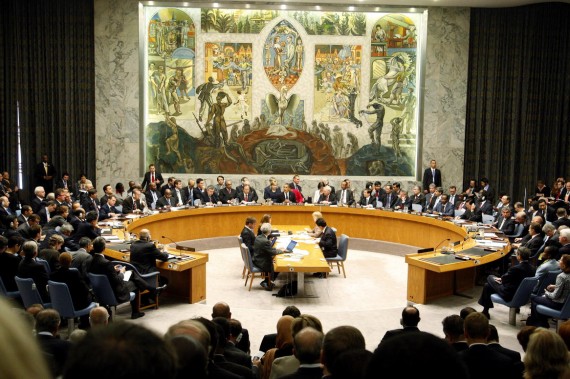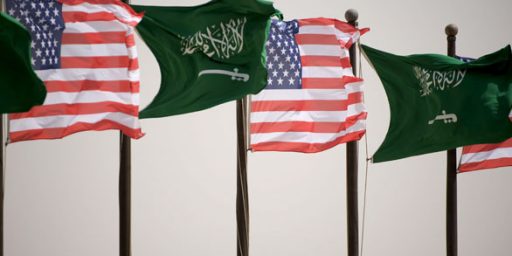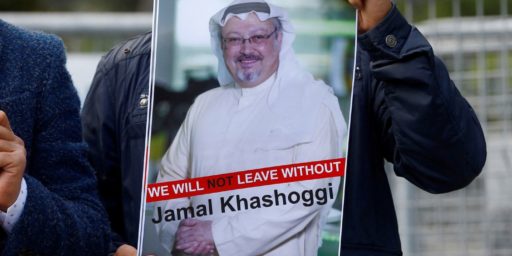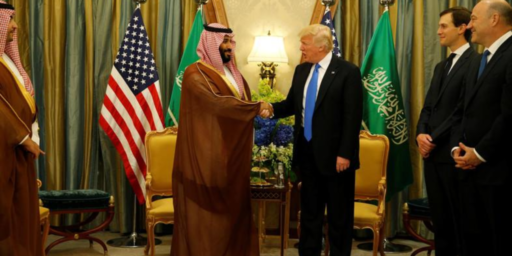Saudi Arabia Turns Down Seat On U.N. Security Council
The Kingdom of Saudi Arabia has turned down an invitation to take one of the ordinarily coveted rotating seats on the United Nations Security Council, citing as their primary reason the failure of that body to do anything about the situation in Syria:
LONDON — Assailing what it called double standards at the United Nations, Saudi Arabia on Friday took the unprecedented step of rejecting a highly coveted seat on the United Nations Security Council it had won for the first time just a day earlier.
The protest, made known in a statement from the Saudi Foreign Ministry carried by the official Saudi Press Agency, said, “The manner, the mechanisms of action and double standards existing in the Security Council prevent it from performing its duties and assuming its responsibilities toward preserving international peace and security as required.”
The gesture appeared to reflect Saudi Arabia’s simmering annoyance at the Security Council’s record in Syria, where Russia and China — two of the five permanent members — have blocked Western efforts, broadly supported by Saudi Arabia, to pressure President Bashar al-Assad. The other permanent members are the United States, Britain and France.
The announcement came a day after Chad, Chile, Lithuania, Nigeria and Saudi Arabia were elected to seats on the 15-member Security Council for a two-year term starting in January. They replace Azerbaijan, Guatemala, Morocco, Pakistan and Togo. The seats are prized because they give officials access to high-level diplomacy and offer a rare opportunity to influence events.
Diplomats at the United Nations said they were shocked by the Saudi gesture and could not recall a previous time when a member state elected to one of the nonpermanent seats had rejected it. “The actual rejection by an elected member seems unprecedented,” one diplomatic official said.
It was unclear whether the Saudi decision was reversible. Efforts to reach Saudi officials for further elaboration were not immediately successful.
Also unclear was whether the 193-member United Nations General Assembly would need to convene again for a special election to replace Saudi Arabia on the Security Council if the Saudis insist on refusing the seat.
The council has met before without a full membership. Diplomats recalled that in 1950, Russia refused to sit at the council table, but the Russians did not repudiate their seat and the council still convened with 14 members.
Saudi Arabia’s rejection of the seat was a sharp departure from its preference for quiet diplomacy to advance its aims, particularly at a time of great regional uncertainty, with the civil war in Syria affecting neighboring countries and the United States, Saudi Arabia’s biggest international backer, pursuing what seems to be a cautious and untested opening toward Iran, the Saudis’ main regional adversary.
Saudi Arabia’s decision to turn down the seat, after trying for the first time to win it, seemed all the more surprising because its efforts to seek representation had been taken by experts as a reflection of the kingdom’s wish to be more assertive in resolving the Syrian civil war and the Arab-Israeli conflict.
Tthe Saudi ambassador to the United Nations, Abdallah Y. al-Mouallimi, said after the General Assembly vote on Thursday that it was “a reflection of a longstanding policy in support of moderation and in support of resolving disputes by peaceful means,” The Associated Press reported.
The statement on Friday struck a far less conciliatory tone, calling for changes to enhance the Security Council’s contribution to peace. It did not say what those should entail.
Given that most nations outside the UNSC permanent members quite often openly covet a seat on the Security Council, this seems like an odd decision on the Saudi’s part, made doubly so by the fact that they had been campaigning for the seat all the way up until yesterday. Not being an expert on Saudi affairs, I’m not even going to begin to try to speculate on what’s going on here, other than to say that it’s darned odd. In any case, as John Burgess notes, this probably comes as a relief to human rights groups who had been protesting the idea of including Saudi Arabia on the most important United Nations body of them all.






My hunch is that they don’t want the attention that comes with the seat. They prefer to work behind the scenes, under the radar, whenever they can. For them to take the seat would be like Karl Rove or George Soros or William Ayers running for elected office.
Or that they expect a future UNSC vote on an attack on Iran. They would not want to be put in a position of sanctioning possible Israeli military attacks on an Islamic state.
@DC Loser: That could be a factor, but I doubt it was the only element. However, it would be an excellent particular example of the principle I put forward.
Again, as a pure hunch, based on zero scholarly work or profound thought.
I hate to speculate that something in Middle Eastern politics is exactly what it appears to be, but that might be the case here. First of all, monarchies are quite capable of making sudden policy changes. Secondly, they never consider anyone else to have the higher ground. They have no reason to fear the spotlight – Pakistan was a member of the Securty Council until recently. As far as Saudi Arabia is concerned, everything they do is entirely reasonable. So ask yourself, what would they gain by being on the Council, and what would they gain by thumbing their noses at the Council? With the latter move, they may gain a lot in the eyes of their fellow Muslims/Middle Easterners.
@Pinky: So, it’s a case of “nothing to gain and quite a bit to lose” by taking the seat? Hm… that also fits. And their description of the futility of the UNSC is pretty accurate, too.
Stability + Mecca + Unfathomable Wealth is a pretty strong combination these days. Saudi Arabia would love to be the counterweight to Iran. The trick is the Arab League. It has almost no power as an organization and has had some strong-willed members historically. But look at the once-strong members now – Iraq, Egypt, Libya, Sryia? They’re messes. The Saudis want to revitalize the Arab League. That’s probably the audience that they’re playing to, not the UN.
A strong and self confident nation would seat itself graciously and at least attempt to use the position to effect empowering changes for peace on the council. IMO the contemptuous slight obscures the Saudi regime’s profound weakness.
Just to be clear…
On this thread we have very conservative and very liberal commentators engaging in a constructive dialogue regarding an important nation and an important international institution, all the while without tossing bombs.
Insanity.
Jenos, you’re stupid and your momma didn’t teach you how to dress right. Pinky…something something conservative, something hostage taking terrorist. Umm..all you liberals want Obama to put grandmothers to death via death panels and government seized guns.
Whew. Much better.
@Neil Hudelson: Eh, you’re just a big poopyhead. And you smell funny.
But back on topic… I’ve always seen the Saudi’s defining trait as a desire to preserve their own status quo. They pay off their home-grown radicals to go be difficult other places. They want to keep the oil prices and quotas in the sweet spot to preserve their wealth. And they want to be seen as trustworthy guardians of the two holiest sites in Islam. They worry about the radical Muslims because they fear that the nuts will decide that Mecca and Medina need to be rescued from the unworthy Saudis, so they like a certain level of tension in the Muslim world — keeping the crazies going after each other, the Jews, the Westerners — basically anyone but the Saudis.
With that as their goal, taking the UNSC seat would put them in a position where they would be expected to play a more active role on the world stage. That would mean openly taking sides in some of the nastier disputes going on right now — such as the Syrian civil war and Iran’s nuclear weapons program. And when you openly take a side, you tend to piss off the other side.
However, we aren’t talking about completely rational actors here, we’re talking about the more militant elements of Islam. Just taking a side often isn’t enough. You better go whole hog (so to speak) on that side, and make sure they win, or they are just as likely to scapegoat you for their failure and turn on you.
So there really is no up side to the Saudis taking the seat. They don’t need the prestige, and they don’t want the influence and corresponding responsibility. And by turning it down in the way they did, they score points for style.
@Neil Hudelson:
That’s because the site’s top ten parrots didn’t show up.
@Pinky: That’s because the site’s top ten parrots didn’t show up.
Good lord, Pinky, that was dangerously close to a compliment.
Or should I complain that I didn’t make the top 10?